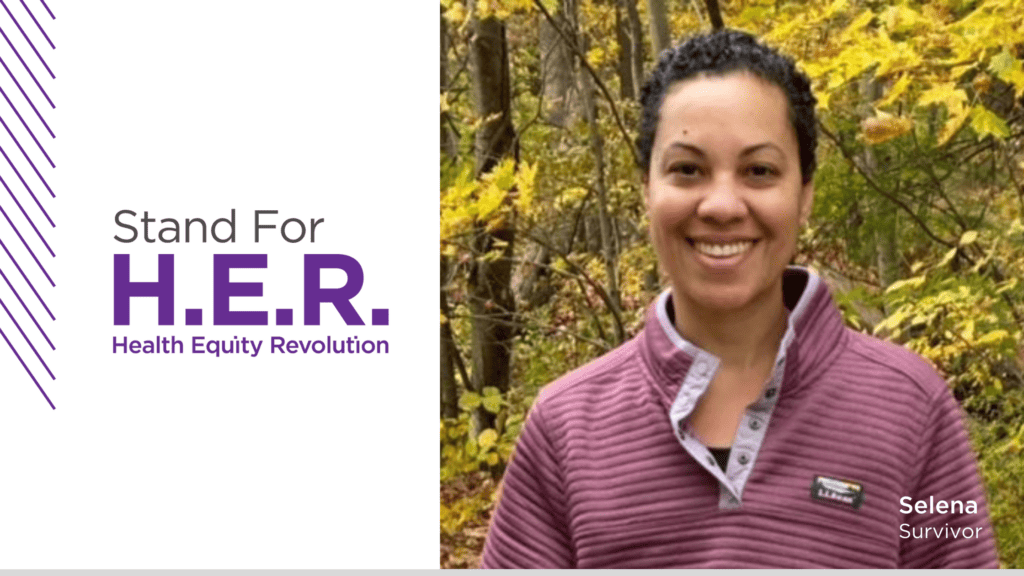
Life took a sharp turn for Selena Smith-Albino in September 2020.
That’s when the market sales director was diagnosed with invasive ductal carcinoma breast cancer, six months after getting a clean bill of health following a mammogram at age 41.
The diagnosis of stage 3 breast cancer would have repercussions for her entire family.
When Selena felt a lump one day, it seemed to appear out of nowhere. Due to the cancer’s rapid growth and spread from her left breast to her lymph nodes, her doctors urged her to undergo genetic testing.
Testing revealed that she had the BRCA1 gene mutation.
“Of my four siblings, two of my sisters have since tested positive for the gene mutation,” says Selena, who lives in New Jersey with her husband and two stepchildren. One sister tested negative.
Given the discovery of the mutation, other family members were suddenly faced with decisions about testing and reducing their risk by having a prophylactic double mastectomy, which Selena and her younger sister both opted for. Twenty lymph nodes under Selena’s arm were also removed.
An older sister is considering a prophylactic double mastectomy as well.
Her younger sister plans to have her fallopian tubes and ovaries (prophylactic oophorectomy) removed to reduce the risk of ovarian cancer, a step that Selena has already taken.
“For my sisters, it was important to get tested for their own health, but also to understand how this impacts their kids’ lives and medical decisions later on,” Selena says.
In addition to surgery, Selena has been treated with radiation therapy and five months of chemotherapy. She also joined two clinical trials because of the higher risk of recurrence within the first five years.
She enrolled in a lymphovenous bypass trial to reduce the chance of developing swelling caused by buildup of lymph fluid. She participates in a yearlong OlympiA trial, which is studying use of a medication to keep those with BRCA gene mutations in remission longer.
“I decided to do whatever I needed to do so I can live out the rest of my life,” she says.
During this time, self-care has been key.
Selena has always lived a healthy lifestyle. She’s a vegetarian, avid walker and a yoga practitioner. She’s always pictured herself as “a helper” who supported others.
Now the tables have turned.
“It was challenging to recognize that this isn’t something that you can face alone,” she says. Being immunocompromised during the COVID-19 pandemic added to her feelings of isolation.
Working as much as possible between treatments kept her from becoming preoccupied with her cancer, and her colleagues have been supportive and accommodating.
She turned to journaling and Facebook to explore her feelings and to explain her situation to friends, relatives and others. In response, she’s received many cards and letters of support.
“We’ve got to support and look out for each other,” Selena says. “We also need to build a network of supportive doctors that we feel comfortable with—and trust. We have choices. At one point I decided to change one of my doctors.”
She urges women to prioritize their health.
That means not putting off their own needs by delaying routine exams and mammograms.
She also urges women “to trust in science,” while also educating themselves about their options.
“What I would tell others is, take it all in and recognize that what you might have to do next is scary, it can be uncomfortable. But the alternative might be worse.”
Last summer, she learned that a 52-year-old relative died of stage 3 triple negative breast cancer, the same type as hers. Her death highlighted “just how close and real this is, and the importance of knowing your family history,” she says.
“I’ve always supported and participated in breast cancer walks, not realizing that I, one day, would benefit from all of the research, all of the fundraising and the supportive community,” she says. “When something doesn’t feel right, don’t be afraid of it. Because knowing is powerful. You can do something about what you know about.”



